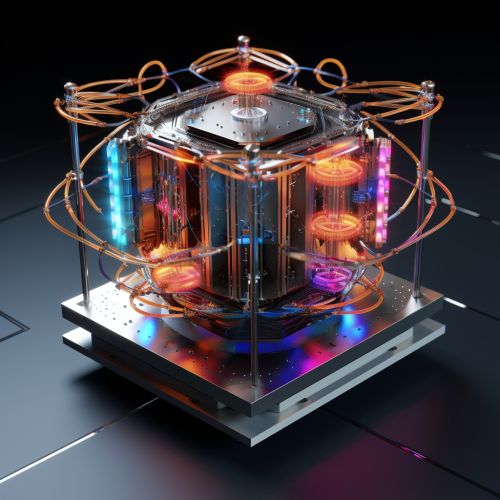Quantum Programming
Introduction
Quantum programming is a set of computer programming techniques that are used to express quantum algorithms. It involves the use of quantum programming languages to create programs that can be run on a quantum computer. Quantum programming languages are designed to incorporate the principles of quantum mechanics, which are fundamentally different from those of classical physics.


Quantum Mechanics and Quantum Computing
Quantum mechanics is a branch of physics that deals with phenomena on a very small scale, such as molecules, atoms, and subatomic particles. It is characterized by the principles of superposition and entanglement.
Superposition is the ability of a quantum system to be in multiple states at the same time. In the context of quantum computing, this means that a quantum bit, or qubit, can be in a state of 0, 1, or both at the same time. This is in contrast to a classical bit, which can only be in one state at a time.
Entanglement is a phenomenon in which two or more quantum particles become linked, such that the state of one particle is directly related to the state of the other, no matter the distance between them. This property is used in quantum computing to link qubits together in a way that allows for complex computations to be performed more efficiently than on classical computers.
Quantum Programming Languages
There are several quantum programming languages that have been developed, each with its own unique features and capabilities. These include Q#, Qiskit, Quipper, and many others.
Q# is a quantum programming language developed by Microsoft. It is designed to be used with the Quantum Development Kit, which includes a quantum simulator that can simulate up to 30 qubits.
Qiskit is an open-source quantum computing framework developed by IBM. It includes a set of quantum programming tools and libraries, as well as a quantum simulator and access to IBM's quantum computers.
Quipper is a quantum programming language that is embedded in Haskell. It is designed for expressing complex quantum algorithms and for performing quantum circuit simulations.
Quantum Algorithms
Quantum algorithms are algorithms that can be run on a quantum computer. They take advantage of the principles of quantum mechanics to solve problems more efficiently than classical algorithms. Some of the most well-known quantum algorithms include Shor's algorithm, Grover's algorithm, and quantum Fourier transform.
Shor's algorithm is a quantum algorithm for factoring large numbers. It is significantly faster than the best known classical factoring algorithm, and its discovery led to increased interest in quantum computing.
Grover's algorithm is a quantum algorithm for searching an unsorted database. It provides a quadratic speedup over classical search algorithms.
Quantum Fourier transform is a linear transformation on quantum bits, and is part of many quantum algorithms, including Shor's algorithm.
Challenges and Future Directions
Despite the potential advantages of quantum computing, there are several challenges that need to be overcome. These include the physical implementation of quantum computers, error correction, and the development of more efficient quantum algorithms.
The physical implementation of quantum computers is a significant challenge due to the need for extremely low temperatures and isolation from the external environment.
Quantum error correction is another major challenge, as quantum systems are very susceptible to errors due to decoherence and other quantum noise.
The development of more efficient quantum algorithms is also a key area of research. While there are some problems for which quantum algorithms are known to be more efficient than classical ones, for many problems it is still unknown whether a quantum advantage can be achieved.
